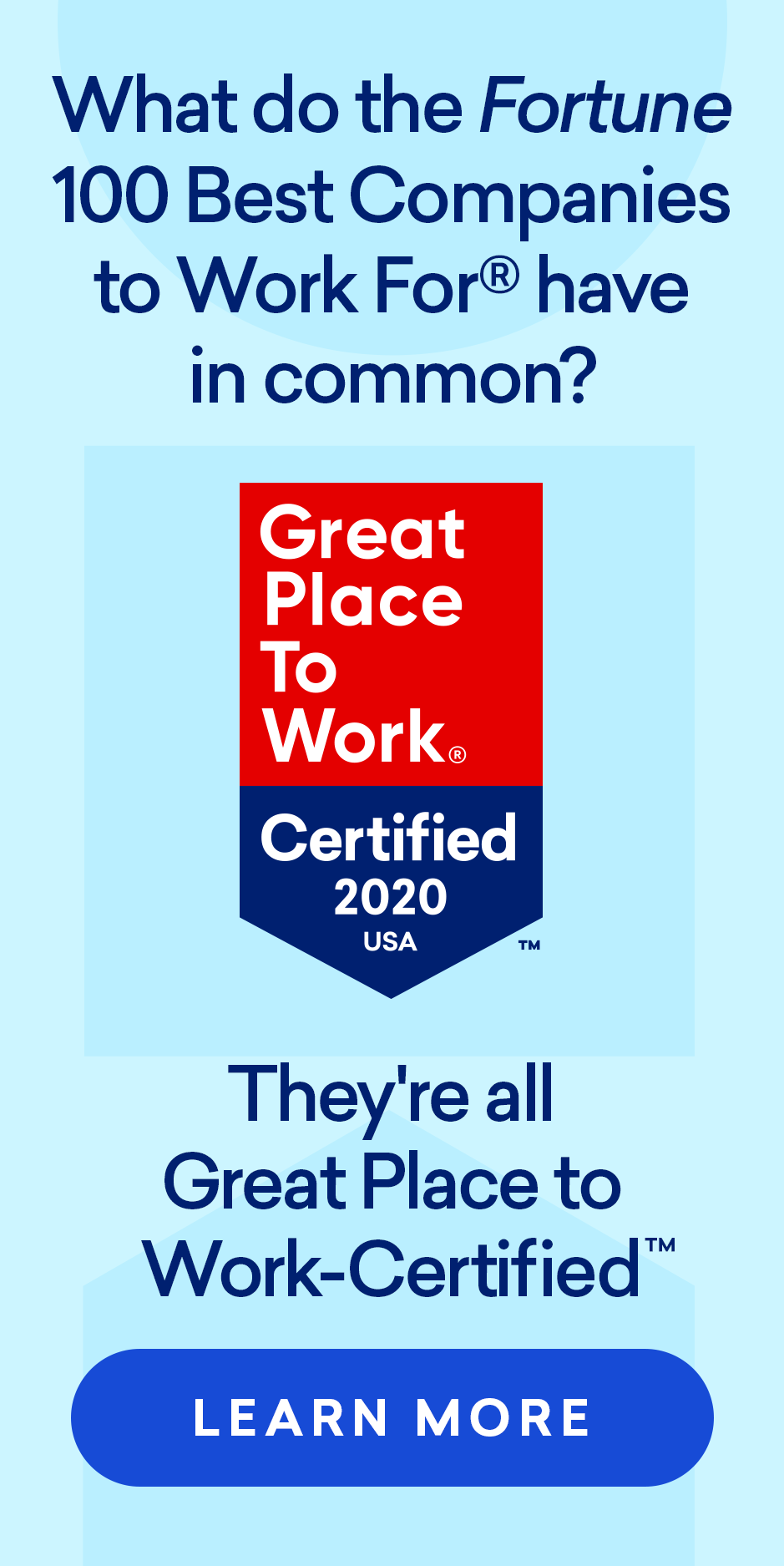Smart companies have figured out that happy workplaces mean bigger bottom lines and winning the talent battle. Which is only good news for you.
According to a seemingly endless number of research studies--all arriving at the same conclusion--the American workplace has become profoundly destructive to the human spirit.
Neither a wise man nor a brave man lies down on the tracks of history to wait for the train of the future to run over him. --Former U.S. General and President Dwight D. Eisenhower
The trends have become all too familiar: Employee engagement and job satisfaction have fallen to modern-day lows, countless workers can’t wait for the job market to fully recover so they can high-tail it out of organizations they feel deeply disregard them--and a huge percentage of people enjoy their commutes to and from work more than the jobs they are heading to.
To state the blatantly obvious, all this discontent can’t be very good for business. It also begs the question: How much better can all companies perform were we collectively able to restore worker engagement and loyalty?
For the past several months, I’ve been intrigued by evidence that some astute firms are well on their way to transforming their leadership practices in response to these dour trends. Convinced we’ve reached an inflection point where traditional methods have become fully destructive to organizational success, they’ve initiated more caring and supportive methods to intentionally humanize their work environments--and gain a competitive advantage in the process.
In January, I began writing a series of articles for Fast Company, each one dedicated to better understanding the movement to create “great workplaces.” The underlying reason for all this research is to answer one question: Will this inevitably prove to be a feel-good strategy that flames out--or an approach to leadership that will derail organizations which fail to get on board?
If you hold any position in leadership today, you should know this: Companies that authentically value their employees will be (and already are) the big winners in the 21st-century economy.
Here’s my evidence:
In a visit to software analytics giant, SAS, I met CEO and cofounder Jim Goodnight, arguably the pioneer of a workplace culture that esteems employees over customers and owners. Several times ranked the “Best Company To Work For” in America, and recently named the world's best multinational workplace, SAS has produced record profits for 37 consecutive years. A company that emphasizes trust, generosity, and work-life balance has a track record of success that irrefutably proves companies “reap what they sow.” A talent magnet because of their “Great Place To Work” status, SAS now receives 100 applications for every open position.
I met with senior executives at Google who’ve made it their prime mission to create the best workplace in the universe. They’re already #1 in the United States. Google takes it on face value that employee well-being is a profound driver of productivity and innovation, and ensures its workers have great influence on their work hours--and a significant voice in how the firm is run. Since it went public nine years ago, Google’s stock has soared 800%.
I interviewed Gallup chief scientist Jim Harter, who launched the first “State of the American Workplace” study in 1997, and recently revealed that only 3 in 10 U.S. workers are engaged in their jobs. To fix this, says Harter, companies need to find deeply caring leaders “capable of seeing, supporting, and adjusting to the differences in people. The truly differentiated manager will be someone who understands that the more they nurture and support employees, the more success they will produce.”
I went to see Jerome Dodson, founder of Parnassus Investments. Since 2005, Dodson has been the portfolio manager for the Parnassus Workplace Fund, a mutual fund that invests exclusively in companies regarded by employees as great places to work. Over the past eight years, the Workplace Fund has had an average return of 9.63%--more than 4% higher than the S&P 500 index in the same timeframe. “What these companies have proved to Wall Street,” says Dodson, “is that treating employees well, and truly respecting them, consistently leads to far better business performance.”
My Research Continues:
For the next step in my journey, I visited with Robert Levering, cofounder and CEO of the Great Place To Work Institute.
Since 1997, Levering’s firm has determined which organizations make Fortune magazine’s annual list of the “100 Best Companies To Work For” in America--and now produces a similar list in nearly 50 other countries.
Levering, along with business partner, Milton Moskowitz, got his start in evaluating workplaces nearly 30 years ago, and has, perhaps, the greatest optics into the future of business leadership. Nearing his 70th birthday, he has no interest in retiring: “I think we’re on the threshold of becoming even more significant in the corporate world,” he said proudly. Here are some of his key insights:
Few Organizations Historically Sought To Become A Great Place To Work
“When Milt and I started,” Levering told me, “being perceived as a great employer was categorized as a ‘nice to have’ in major organizations. Few sought to actively pursue it. But definitely in the last 10 years--it increases every year--more people in the C-suites have grown convinced that creating a great workplace is integral to their success as a business. Just recently, I visited Intel, and the (former) CEO, Paul Otellini, articulated his vision brilliantly when he told his team: ‘We want to attract the very best talent, and you can’t do that unless you acquire a reputation for having a great workplace--and people feel it when they are there. And, if you want to get the most out of them for the shareholders, we know they’re only going to excel if they think Intel is a great place to be.’”
After Decades Of Insincere Efforts, Business Is Now Shifting,
Back in the 1990s, many companies began proclaiming that their people “were their greatest asset.” According to Levering, just the idea that workers were being described in financial terms suggested these expressions were nothing more than lip service.
But Levering believes business leaders are being forced to change their ways. “I think it’s really clear that technological change has made having very talented employees increasingly important,” he stressed. “Underlying that is how competitive business has become everywhere. At one time, there were real monopolies--companies that effectively had very secure markets. I don’t think there are such things anymore--and this means companies have to be constantly innovating and relying on people to produce it. So, what’s really shifted is the understanding that companies cannot succeed without attracting and retaining great people. CEOs, therefore, are coming to value people with much greater authenticity.”
Levering also is very clear that most organizations are changing their leadership cultures simply in recognition that doing so is expansive to the bottom line. “What we’re finding are CEOs, like at Intel, who genuinely care about people--yet they simultaneously understand their doing so has become an important aspect of running their company. It’s not altruistically motivated,” he insists. “CEOs are coming to justify creating great workplaces in business terms.”
We’re Near The Tipping Point. For Organizations To Endure, They Must Create More Supportive Cultures
Robert Levering not only is convinced a major shift in workplace management has begun to take hold, he’s certain that organizational existence soon will be dependent upon adopting more caring and humane leadership practices.
“I think the focus on becoming a great workplace can best be compared to what happened with the ‘Quality Movement,’” he told me. “Recall back to the 1970s, when producing products with high quality was largely seen as optional in business. That is, until Japanese manufacturers started to beat the pants off American and Western European companies in everything from automobiles to electronics. The sudden competitive disadvantage these organizations faced forced them to acknowledge that making high-quality products had become essential to their success and even to their very survival. Soon, every American company was adopting the quality processes that were pioneered in Japan.”
“I think the same thing is going to happen with workplace issues,” Levering added. “We’re just at the beginning stages where people have started to see that some of the best performing companies are ones that have terrific cultures. CEOs are all wondering, ‘Why is Google so great?’ And if you look at what makes that company so distinctive, you see that it has much to do with the kind of workplace they’re intentionally creating. Because the competitive pressures will be so great, people will come to understand that having a great workplace is not optional anymore and has instead become essential. The urgency for leaders to take action now is to get there before their competitors do. Would you want to have been the last company in your industry to embrace the quality movement?”
About Mark C. Crowley
Leadership consultant and speaker, Mark C. Crowley, is the author of Lead From The Heart: Transformational Leadership For The 21st Century. He’s a frequent contributor to Fast Company, and formerly was Senior Vice President and National Sales Manager at one of America’s largest financial services institutions. More about Mark C. Crowley >>
This article was originally published on FastCompany.com











